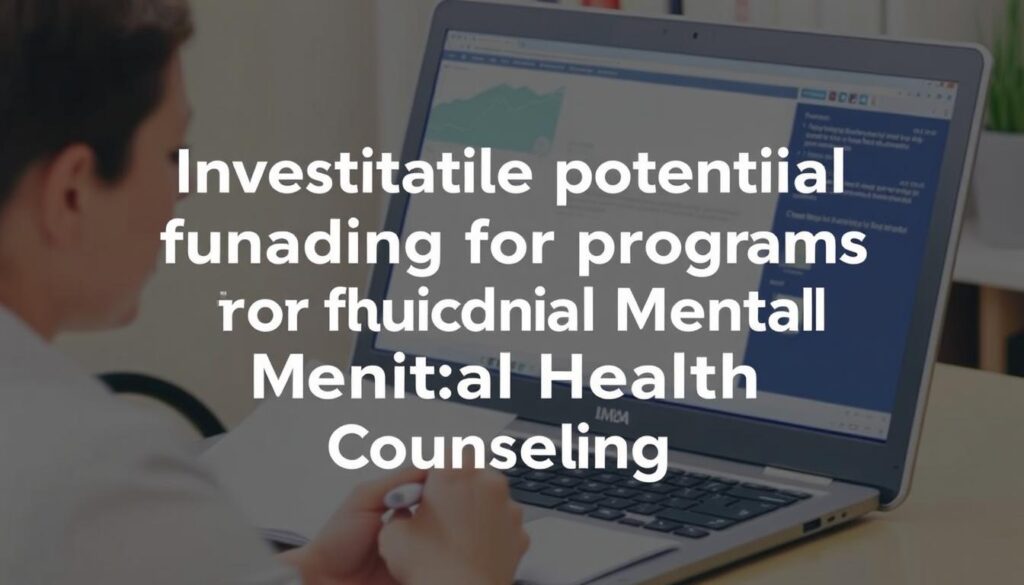Embarking on a career in mental health counseling can be a deeply rewarding journey, allowing professionals to make a positive impact on individuals’ lives. A graduate degree in this field equips students with the knowledge and skills necessary to address various mental health challenges.
Guided by principles of social justice, advocacy, and ethical practice, a Master of Arts in Clinical Mental Health Counseling program prepares students to become licensed professional counselors. This comprehensive overview will explore the structure, curriculum, and career opportunities associated with these graduate programs.
Key Takeaways
- Understanding the structure and curriculum of Clinical Mental Health Counseling graduate programs
- Exploring admission requirements and career opportunities in the field
- The importance of CACREP accreditation for licensure and professional growth
- Skills developed during the program, including assessment techniques and multicultural competencies
- Financial considerations, including tuition costs and potential funding opportunities
Understanding Masters in Clinical Mental Health Counseling Programs
Graduate programs in Clinical Mental Health Counseling focus on developing the clinical skills and ethical foundations required for professional counselors. These programs are designed to provide students with a comprehensive understanding of mental health principles and practices.
Program Structure and Duration
Masters in Clinical Mental Health Counseling programs typically require 60 semester hours of coursework and clinical experience, designed to be completed in 2-3 years of full-time study. The programs are structured to include both didactic classroom learning and hands-on clinical practice through practicum and internship experiences in real counseling settings.
- Didactic classroom learning provides a foundation in counseling theories and techniques.
- Practicum and internship experiences offer hands-on training in real-world settings.
Core Values and Educational Philosophy
The educational philosophy of these programs is grounded in a developmental, wellness-oriented approach to mental health that emphasizes client strengths and resilience. Core values that guide these programs include multiculturalism, social justice, advocacy, ethical practice, and evidence-based approaches to counseling.
By emphasizing these core values, programs ensure that students develop a strong professional identity aligned with the American Counseling Association’s definition of counseling.
Comprehensive Curriculum and Coursework

A Master’s in Clinical Mental Health Counseling is built on a comprehensive curriculum that prepares students for the complexities of mental health services. The program is designed to meet the highest standards of counseling related educational programs, ensuring that graduates are well-equipped to provide effective counseling services.
Core Required Courses
The curriculum includes a set of core required courses that cover fundamental areas such as counseling theories, professional ethics, human development, psychopathology, assessment techniques, multicultural counseling, and research methods. These courses are crucial in developing a strong foundation in mental health counseling.
| Course Code | Course Name | Credits |
|---|---|---|
| CPS 6010 | Professional Identity and Ethics in Mental Health Counseling | 3 |
| CPS 6410 | Basic Counseling Skills | 3 |
| CPS 8100 | Psychobehavioral Diagnosis | 3 |
Clinical Practice Requirements
Clinical practice is a critical component of the program, requiring students to complete a practicum (100 hours) and internship experiences (600+ hours). During this time, students work directly with clients under the supervision of experienced professionals in mental health settings.
Elective Opportunities
The program also offers elective courses that allow students to develop expertise in specialized areas such as addiction counseling, trauma treatment, child and adolescent therapy, or gerontological counseling. These electives enhance the students’ ability to provide targeted mental health services.
Admission Requirements and Application Process

Pursuing a Master’s in Clinical Mental Health Counseling requires a thorough understanding of the admission requirements and application process. Prospective students must navigate a series of steps to successfully apply for these graduate programs.
Academic Prerequisites
Typically, a bachelor’s degree from an accredited institution with a minimum GPA of 2.5-3.0 is required, though this can vary by program. While many students have undergraduate majors in psychology, social work, or human services, programs often accept students from diverse academic backgrounds who demonstrate a strong interest in the counseling profession. For more detailed information on specific program requirements, prospective students can visit the program admissions page.
Application Components
The application process generally begins 9-12 months before the intended start date. Standard components include official transcripts, a professional resume or CV, a statement of purpose or goals statement, and letters of recommendation (typically 2-3). Many programs also require prerequisite coursework in areas such as psychology or statistics.
Interview Process and Timeline
The interview process is a critical component of the admission process, assessing personal qualities and interpersonal skills essential for effective counseling practice. Interviews may be conducted individually or in groups and often include opportunities for applicants to learn more about the program. The application timeline typically involves submission deadlines 3-6 months before the program start date, with interviews and admission decisions following within 1-2 months.
| Application Deadline | Interview Period | Admission Decision |
|---|---|---|
| March 1 | Mid/Late April | Late April/Early May |
CACREP Accreditation and Its Importance
Accreditation by the Council for Accreditation of Counseling and Related Educational Programs (CACREP) is a hallmark of excellence in mental health counseling education. This accreditation ensures that programs meet rigorous standards, providing students with a high-quality education.
Understanding CACREP Standards
CACREP sets standards that encompass eight core curriculum areas, including professional counseling orientation, social and cultural diversity, and research and program evaluation. These standards ensure that accredited programs provide comprehensive education and training.
- CACREP standards cover key areas such as human growth and development, career development, and counseling techniques.
- Programs must maintain specific faculty-to-student ratios and ensure faculty have appropriate credentials.
Benefits of Attending an Accredited Program
Graduating from a CACREP-accredited program streamlines the licensure process and provides a competitive advantage in the job market. It also facilitates the portability of credentials across state lines.
- Employers often prefer candidates from accredited programs.
- Accreditation promotes continuous program improvement and accountability.
Essential Skills and Knowledge Development
The Clinical Mental Health Counseling graduate programs focus on fostering the development of critical skills and knowledge in future counselors. Students are prepared to work with diverse client populations across various settings.
Clinical Assessment and Intervention Skills
Students develop proficiency in evidence-based assessment techniques, including clinical interviewing and mental status examination. They learn to formulate comprehensive case conceptualizations that inform treatment planning.
Multicultural Competence and Social Justice
Multicultural competence is integrated throughout the curriculum, enabling counselors to work effectively with clients from diverse backgrounds. Programs emphasize social justice advocacy, teaching students to address systemic barriers affecting clients’ wellbeing.
Crisis Intervention and Trauma-Informed Care
Crisis intervention training prepares counselors to respond to acute situations, including suicidal ideation and trauma responses. Trauma-informed care principles are also incorporated, helping students understand the neurobiological impacts of trauma.
The following table summarizes key skills and knowledge areas developed in Clinical Mental Health Counseling programs:
| Skill/Knowledge Area | Description | Application |
|---|---|---|
| Clinical Assessment | Evidence-based assessment techniques | Case conceptualization and treatment planning |
| Multicultural Competence | Understanding sociocultural factors | Effective practice with diverse client populations |
| Crisis Intervention | Responding to acute situations | Managing crisis situations effectively |
Career Opportunities After Graduation

A master’s degree in Clinical Mental Health Counseling opens doors to diverse career paths in the mental health field. Graduates are equipped with the knowledge and skills necessary to work in various settings, providing critical support to individuals, groups, and communities.
Employment Settings and Roles
Graduates of clinical mental health counseling programs find employment in diverse settings, including community mental health centers, private practices, hospitals, residential treatment facilities, college counseling centers, and employee assistance programs. Career roles extend beyond direct clinical service to include positions in program management, clinical supervision, consultation, education, and advocacy within the mental health field.
Licensure Requirements and Process
Licensure requirements vary by state but typically include completion of an accredited master’s program, accumulation of 2,000-4,000 post-graduate supervised clinical hours, passing a national examination, and meeting state-specific requirements. The licensure process generally involves provisional or associate licensure while completing supervised practice hours, followed by application for full licensure as a Licensed Professional Counselor (LPC) or equivalent title.
With a strong foundation in mental health counseling, graduates are well-prepared to pursue specialized certifications in areas such as trauma therapy, play therapy, substance abuse counseling, or marriage and family therapy. This not only enhances their practice but also increases their marketability in a competitive job market.
The employment outlook for mental health counselors is exceptionally positive, with the Bureau of Labor Statistics projecting a growth rate significantly higher than average for all occupations through 2030. This promising outlook, combined with the personal fulfillment that comes from helping others, makes a career in clinical mental health counseling a rewarding and sustainable choice.
Program Costs and Financial Aid Options

Pursuing a Master’s in Clinical Mental Health Counseling is a significant investment in your future, with various funding opportunities available to support your graduate education. The cost of attending a Clinical Mental Health Counseling program can vary widely, depending on factors such as institution type and residency status.
Tuition and Additional Expenses
Tuition for Clinical Mental Health Counseling programs can range from approximately $25,000 to $70,000 total program cost. Additional expenses include textbooks, professional liability insurance, technology fees, and costs associated with professional memberships and conference attendance. Students should also budget for expenses related to practicum and internship experiences.
Scholarships, Assistantships, and Fellowships
Many institutions offer graduate assistantships that provide tuition remission and stipends in exchange for teaching, research, or administrative work. Program-specific scholarships may be available based on academic merit, financial need, or commitment to serving underrepresented populations. Students can also explore federal financial aid options, such as Direct Unsubsidized Loans and Graduate PLUS loans, by completing the Free Application for Federal Student Aid. Professional organizations and some employers also offer scholarships and tuition reimbursement benefits.
Conclusion: Taking the Next Step in Your Counseling Career
As the demand for mental health services continues to grow, pursuing a Master’s in Clinical Mental Health Counseling can position you for success. This graduate degree represents a significant investment in your professional future and in the wellbeing of the communities you will serve.
When selecting a program, consider factors such as CACREP accreditation status, faculty expertise, and clinical training sites. Begin the application process early to ensure adequate time for preparation. Connecting with current students and alumni can provide valuable insights into program culture and strengths.
To prepare for your journey, develop a self-care plan and consider your existing commitments. Remember that becoming a counselor involves supervised practice, continuing education, and self-reflection. Take advantage of professional networking opportunities to enhance your career prospects.
FAQ
What is the typical duration of a graduate program in Clinical Mental Health Counseling?
The program typically takes two to three years to complete, depending on the institution and the student’s enrollment status.
What are the core values of a Clinical Mental Health Counseling program?
The core values include a commitment to social justice, multicultural competence, and the development of skilled counselors who can provide effective services to diverse populations.
What kind of coursework can I expect in a Clinical Mental Health Counseling program?
The curriculum typically includes courses in counseling theory, human development, and clinical practice, as well as electives in areas such as crisis intervention and trauma-informed care.
What are the admission requirements for a Clinical Mental Health Counseling program?
Admission requirements typically include a bachelor’s degree from an accredited institution, letters of recommendation, and a personal statement, as well as prerequisite coursework in areas such as psychology and statistics.
Why is CACREP accreditation important for a Clinical Mental Health Counseling program?
CACREP accreditation ensures that the program meets rigorous standards for curriculum, faculty, and clinical training, which is essential for licensure and certification as a mental health counselor.
What kind of career opportunities are available to graduates of a Clinical Mental Health Counseling program?
Graduates can pursue careers in a variety of settings, including community agencies, schools, and private practice, and can work in roles such as counselor, therapist, or program director.
How do I know if a Clinical Mental Health Counseling program is right for me?
Consider factors such as the program’s curriculum, faculty expertise, and clinical training opportunities, as well as the program’s accreditation status and licensure pass rates.
What kind of financial aid is available to students in a Clinical Mental Health Counseling program?
Students may be eligible for scholarships, assistantships, and fellowships, as well as federal and private student loans, to help cover the costs of tuition and living expenses.

